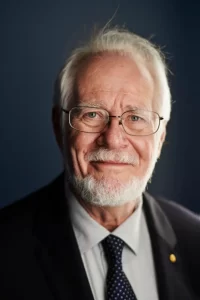Jacques Dubochet is a Swiss biophysicist who was awarded the Nobel Prize in Chemistry in 2017 for his contribution to the development of cryo-electron microscopy, a technique that allows the observation of biomolecules at atomic resolution. Born in Aigle, Switzerland in 1942, Dubochet studied physics and biophysics at the University of Lausanne, where he later served as a professor.
He worked at the European Molecular Biology Laboratory (EMBL) in Heidelberg, Germany, before returning to Lausanne to establish his own research group. The technique of cryo-electron microscopy revolutionized structural biology, making it possible to generate high-resolution 3D images of biological molecules and their interactions, and has become an essential tool in drug development and other fields. Dubochet’s work in this area has made him one of the most influential scientists of his generation, and a model for young researchers around the world.
Jacques Dubochet is a Swiss biophysicist who was awarded the Nobel Prize in Chemistry in 2017 for his contribution to the development of cryo-electron microscopy, a technique that allows the observation of biomolecules at atomic resolution. Born in Aigle, Switzerland in 1942, Dubochet studied physics and biophysics at the University of Lausanne, where he later served as a professor.
He worked at the European Molecular Biology Laboratory (EMBL) in Heidelberg, Germany, before returning to Lausanne to establish his own research group. The technique of cryo-electron microscopy revolutionized structural biology, making it possible to generate high-resolution 3D images of biological molecules and their interactions, and has become an essential tool in drug development and other fields. Dubochet’s work in this area has made him one of the most influential scientists of his generation, and a model for young researchers around the world.
Sorry, no records were found. Please adjust your search criteria and try again.
Sorry, unable to load the Maps API.
aigle
aigle
Switzerland

